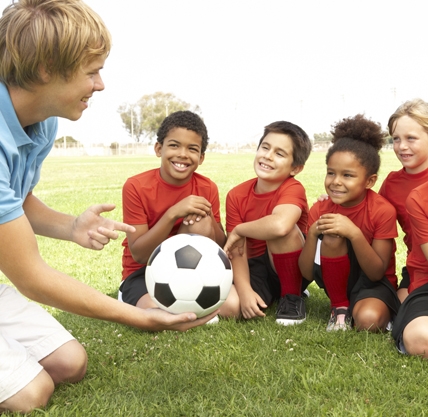
My daughter is 12 and lives and breathes soccer. She adores her coach, who’s great on many levels. However, he seems to minimize the potential dangers of concussions. He’s definitely of the school of “no blood, no break — back in the game.” I don’t think my daughter or her teammates would ever sit out voluntarily, even when we tell them to be careful and listen to their bodies — and brains. As a parent, how can I educate my daughter's soccer coach ... to truly get him to listen and to protect his players?
It’s great to hear that your daughter loves sports and is active and healthy. But you are right, she, her teammates, and especially her coach need to know what to do if a player sustains a concussion.
The good news is that the public is hearing more and more about the potential long-term effects of concussion in sports — from kids to professional football players.
Kids playing soccer can suffer a concussion by being hit by a ball at close range, colliding heads with another player, or hitting their head against the goal post or the ground. And, of course, a concussion can occur without losing consciousness.
The evidence is clear that children or adults who sustain a concussion should not immediately return to play. Having another concussion before the brain has healed can cause serious, even fatal consequences. The coach, players, and parents should all learn to recognize these signs of concussion:
- Dazed, confused
- Unable to attention or remember what just happened
- Nausea or headache
- Sensitivity to light or noise
If you think your daughter’s coach is not sufficiently educated about concussions, you don’t have to look like an overprotective mom, instead present him with some authoritative educational sources. The Centers for Disease Control and Prevention (CDC) has developed specific toolkits for coaches, parents, and players.
You can play an instrumental role by making sure that each group receives this information.
Coaches
The CDC toolkit for coaches provides information about concussion and how to identify it. The fact sheet provides four steps for coaches to follow when a player shows signs of concussion:
- Take the child out of the game.
- Note relevant information (how the injury occurred, length of loss of consciousness, and other symptoms) and make sure the child sees a health professional.
- Inform the parents and provide information about the concussion.
- Keep the child out of play for the remainder of the day and do not allow the player to return to play until approved by a healthcare professional.
The CDC toolkit also provides a free clipboard for coaches plus a poster, and a quiz that all provide key information about signs of concussion and how to respond.
Parents
The CDC’s toolkit for parents includes a fact sheet about the symptoms of concussion and the immediate steps to take. Parents play the most important role during the entire course of their child’s concussion and recovery.
During or immediately after the game, parents should:
- Identify physical or behavioral signs of concussion in their child.
- Seek medical treatment for their child.
After their child has been seen by a health professional, parents should:
- Closely observe their child in the days and weeks that follow for changes in behavior, thinking and attention, or physical symptoms like headache or fatigue.
- Alert their child’s teacher and the school speech-language pathologist. They can monitor your child’s academic performance and provide support that is needed.
Players
The CDC toolkit for players includes a fact sheet that addresses the team directly. It provides prevention tips as well as information about the symptoms of concussion and important follow-up actions that should be taken with injured players.
Teammates influence each other and should watch out for each other. Their behavior, too can, help educate the coach. Group pressure is a powerful tool, even with a popular coach.
Final tips
Finally, here are some suggestions to help your daughter’s soccer coach get the education he needs about concussion:
Contact the school administration or recreational league to ask if training about concussion is provided to all the coaches in the program.
Share the link to the CDC Toolkit for Coaches and urge the program administrators to develop a policy for mandatory training.
Encourage the program to distribute the Fact Sheet on Concussion to all parents of players. In the meantime, hand the sheet out to all the parents on your daughter’s team.
Sit down with your daughter and watch some of the videos of brain injury survivors and their families here on the BrainLine. Review the signs of concussion with her and urge her to speak up if she or her teammates have symptoms of concussion.
About the author: Janet Brown, MA, CCC-SLP
Janet Brown, MA, CCC-SLP spent twenty years in practice at the Veterans Administration Medical Center and at the National Rehabilitation Hospital in Washington, DC. She is the former director of Health Care Services at the American Speech-Language-Hearing Association.


Comments (2)
Please remember, we are not able to give medical or legal advice. If you have medical concerns, please consult your doctor. All posted comments are the views and opinions of the poster only.
Anonymous replied on Permalink
Most of the parents will convince you that they are really interested in the proper education of their children but first they should answer the question what they actually do to give such education to their children. We have to realize that it is not enough just to pay for education and to show where they can get research paper assistance online . Every parent should be a real example for their children, to motivate them, control and support.
Anonymous replied on Permalink
Children with LD are often labeled as "the trouble maker" kid. With that being said a concussion to kids with LD how do can you tell the difference and signs?